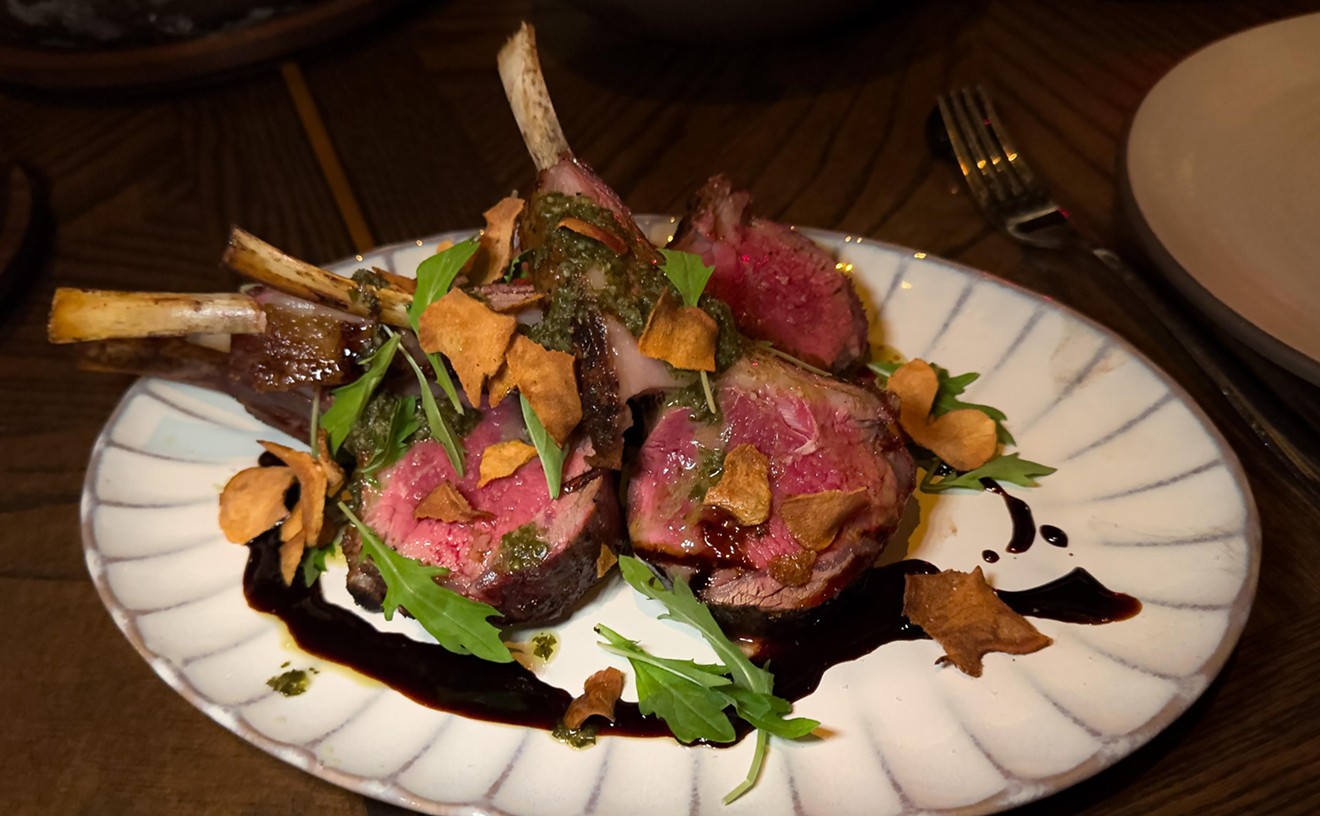The term seafood pancake doesn't necessarily have instant appeal. But think about it: Eggs, vegetables, scallions, and seafood all cooked together in spices and deep-fried to a thin but surprisingly fluffy finish.
Now it’s starting to sound good, right?
If you're not convinced, hear us out. Haemul pajeon is a Korean specialty named for its primary ingredients; pa means green onion, and pajeon is the word for an egg, flour, vegetable, and scallion mixture that strongly resembles what we know as a pancake. The preceding word describes any additional ingredient, which in this case, haemul means seafood.
The pizza-shaped dish is an appetizer meant for sharing, so don’t try to tackle this dish on your own. You will be defeated.
In This Corner: Café Ga Hyang
The Setting: Located in an almost empty strip mall in Glendale, this Korean cafe has a surprisingly comfy atmosphere. The walls are covered with bamboo strips and curtains hang over the small, square cubbies in which patrons can enjoy their meal (and maybe Google the foreign ingredients they are about to enjoy in privacy). Korean soap operas add a touch of authenticity and a little humor to the all-around vibe. The service is friendly and attentive, and the employees were more than willing to explain the plot lines of the aforementioned soap operas to a couple seated on the other side of the restaurant.
The Good: Café Ga Hyang, does not skimp on the vegetables, which isn't surprising considering the stack of onions and carrots that overtakes the counter in preparation to be peeled during an afternoon lull. This pajeon was heavy with scallions and crunchy red peppers. It had a nice, crisp texture all throughout the dish and managed to stay warm longer than expected. The shrimp tasted fresh and the zucchini added the perfect crunch. A small cup of soy sauce mixed with onions, garlic, more peppers, and ginger came with the dish and should definitely be used. It's salty-but-sweet flavor brings much needed diversity to the egg-based dish. Side note: the waitress insisted on a side of kimchi, and we’re glad she did. It was spicy, but, like the soy sauce, broke up the inevitable monotony of the giant pajeon. All in all, we paid about $14.50 for the meal.
The Bad: There was a unfortunate lack of seafood in our seafood pancake. There was a hearty amount of chopped squid, but as perfectly fried as this dish was — and it seems kind of inevitable with this particular level of crispiness — the squid ended up rubbery. And even more unfortunate was the lack of shrimp and complete absence of clam, which is often included in haemul pajeon.
In This Corner: Hodori
The Setting: Located in an Asian shopping center on Dobson Road in Mesa is a small Korean restaurant that attracts large gatherings and familiar faces. The cook points at where you may sit from the kitchen, but in a friendly and welcoming way. Old face masks and pictures of the various dishes simultaneously scare and entice visitors new to Korean cuisine.
The Good: The texture of Hodori's haemul pajeon was incredible, the perfect mixture of crispy on the outside and soft and steamy on the inside. The seafood was anything but sparse and retained the perfect texture, without being overcooked or rubbery. There was also a good serving of clams, which brought a unique texture into play. Though we expected the dish to get a little chewy, the various seafoods were dispersed nicely. The sauce was decadent and spicy, adding just the right amount of kick to the heavy dish.
The Bad: There were not a lot of veggies in this one, as it was more egg and seafood. We missed the zucchini and red peppers as well as that crisp and fresh flavor veggies bring to meal. It was also a little doughy in the middle, definitely resulting in a more filling experience. Hodori's pajeon is a bit more pricey, ringing in at about $16.
The Winner: We have to go with Hodori on this one. They managed to perfect the combination of crispy outside, fluffy inside and did so all without compromising the integrity of the seafood. Their sauce was spicy, but didn't detract from the incredible flavor they achieved with well-cooked fish and fluffiness of the eggs.
Follow Chow Bella on Facebook, Twitter, and Pinterest.
[
{
"name": "Air - MediumRectangle - Inline Content - Mobile Display Size",
"component": "18478561",
"insertPoint": "2",
"requiredCountToDisplay": "2"
},{
"name": "Editor Picks",
"component": "16759093",
"insertPoint": "4",
"requiredCountToDisplay": "1"
},{
"name": "Inline Links",
"component": "17980324",
"insertPoint": "8th",
"startingPoint": 8,
"requiredCountToDisplay": "7",
"maxInsertions": 25
},{
"name": "Air - MediumRectangle - Combo - Inline Content",
"component": "16759092",
"insertPoint": "8th",
"startingPoint": 8,
"requiredCountToDisplay": "7",
"maxInsertions": 25
},{
"name": "Inline Links",
"component": "17980324",
"insertPoint": "8th",
"startingPoint": 12,
"requiredCountToDisplay": "11",
"maxInsertions": 24
},{
"name": "Air - Leaderboard Tower - Combo - Inline Content",
"component": "16759094",
"insertPoint": "8th",
"startingPoint": 12,
"requiredCountToDisplay": "11",
"maxInsertions": 24
}
]










